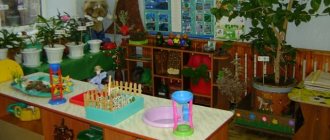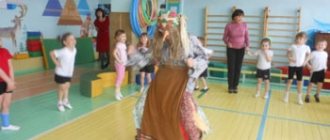Explanatory note
The Federal State Educational Standard for Preschool Education defines targets at the stage of completion of preschool education: “. the child masters the basic cultural methods of activity, shows initiative and independence in various types of activities - play, communication, cognitive and research activities, design, etc.; able to choose his own occupation and participants in joint activities.” (clause 4.6.)
Childhood is a time of active social “development” of a growing person and his assimilation of sociocultural achievements and values, a period of testing and self-determination in constantly expanding and increasingly complex contacts.
Preschool age is traditionally considered a period of intense socialization. Modern children live and develop in completely new sociocultural conditions. The extreme employment of parents, the generation gap, the isolation of the child in the family and other trends negatively affect the socialization of modern children. Effective socialization is one of the main conditions for a child’s life in society in general and the child’s personal readiness for school in particular.
Currently, great importance is given to volunteer work in social society. The institution of volunteering is widespread in many countries. Moreover, the work of volunteers is becoming more and more significant every year in Russian cities.
Volunteer (French volontaire - volunteer) is any individual, including foreign citizens and stateless persons, who contributes to the development of volunteerism by carrying out volunteer activities.
Volunteering is a wide range of activities, including traditional forms of mutual aid and self-help, formal service provision and other forms of civic participation, that are carried out voluntarily for the benefit of the general public without expectation of monetary reward.
Volunteering is based on voluntary work that does not require payment. Consequently, his motives are not in material rewards, but in satisfying social and spiritual needs. Volunteer activities are:
• planting flowers, bushes and trees;
• assistance to such social categories of citizens as: the elderly, street children, youth and students, the homeless, people with disabilities (disabled people), migrants, refugees, former prisoners and others;
• improvement and arrangement of courtyards, plots, city streets;
• helping animals;
• educational conversations;
• charity concerts and theatrical performances;
• environmental marches, garbage and pollution removal;
• promotion of healthy lifestyles; and etc.
A volunteer values such personality traits as hard work, kindness towards people around him, care and respect for nature, responsiveness and mercy, and a strong need for a healthy lifestyle.
The importance of labor as a factor in the development of a child’s personality is reflected in the history of Russian pedagogy: the works of V.A. Sukhomlinsky, P.P. Blonsky, A.S. Makarenko. Of no small importance are the studies of Ya.Z. Neverovich, T.A. Markova, who showed that the main motive that encourages children to work is their desire to help adults.
I.A. Knyazheva, in her dissertation “Pedagogical conditions for the education and development of mercy in children of senior preschool age,” considers mercy as the ability to take pity on the unfairly offended, the weak, the small, the sick, regardless of their external attractiveness; selflessly help those in need without reminders or prompts; give up something meaningful and interesting for the child.
The formation of goodwill in preschoolers was considered in the works of L.M. Shipitsyna, O.V. Zashirinskaya, E.I. Kulchitskaya. P.G. Samorukova studied the caring attitude of preschool children to nature.
The volunteer movement has a number of features, provided that it is organized in a preschool educational institution.
A pressing issue is the creation of a volunteer movement in kindergarten as a social institution that should prepare for life. And life is not only about academic knowledge. This is the development of certain life qualities:
- responsibility;
- mercy;
- independence;
- ability to communicate with different social groups of people;
- personal positivism.
Preschool age is characterized as a period of sensitivity for the development of all mental functions, as well as an important stage in the development and formation of the child’s personality. This served as an incentive to create a volunteer movement in kindergarten, because it is in preschool age that the above-mentioned personal qualities of children are formed.
The novelty lies in the fact that the organization of the volunteer movement is supposed to take place in a kindergarten.
Problem: Lack of experience among children of senior preschool age in demonstrating a social and moral position associated with various aspects of human social life in all their integrity and diversity.
Project goal: To introduce volunteer practice into the group’s activities aimed at developing the spiritual and moral personality of preschool children.
Organization of the volunteer movement “On the Road of Good” in kindergarten through the association of teachers, interested parents and children of senior preschool age and their participation in volunteer events.
Tasks:
- Expand the understanding of the volunteer movement among children 5-6 years old and parents of group students.
- To provide practical skills for participating in the volunteer movement to all participants in the educational process.
- Draw up an action plan and implement it during the 2021–2022 academic year.
Presentation on the topic: Memos for parents
Slide description: What you need to teach your child To love yourself. Until a child values his own life, he will not become active, which means he will not be able to realize himself. Interpret behavior. A child finds himself in various life situations in which he may simply become confused. If a child has learned to understand and explain people's behavior, he will not be inclined to get upset in such situations. The child must be taught to explain his own behavior. He will be able to explain how he behaved in class, whether it was good or bad, why it happened to him and how he felt. Then he will be better able to understand what they want from him, what he is doing wrong and why this happens to him. Communicate using words. A child who can explain what is happening to him in words helps others better understand himself and thereby relieves many problems and troubles. Understand the differences between thoughts and actions. A child cannot feel one thing, think about another, and act in a third. He has childlike, clean communication. If he is worried about something, we need to teach him to talk about his feelings, and not translate them into constant thoughts that he is afraid or embarrassed about. It is recommended to help the child react to his negative emotions through a story, game, dramatization, drawing, pantomime: “Draw, show, tell, play out what is bothering you now, and then we will start doing homework with you!” Be interested and ask questions. All the talk about preparing children for school, interest in learning, and cognitive abilities will be unnecessary if we stop being interested in and responding to the wonderful questions that children ask themselves and those around them: “Why doesn’t the sun fall from the sky?” etc. Understand that there are no simple answers to complex questions. The child will face serious issues, social and scientific problems in life. There is no need to constantly tell him: “You’re still small,” “It’s none of your business,” “When you grow up, you’ll understand.” You can lift the veil and show that not all questions have clear answers. By doing this, we will develop the child’s stereoscopic, global, and not just black-and-white thinking. Do not be afraid of failures. To learn anything, a child should not be afraid of mistakes and failures. Children need to be helped to understand that they can learn from mistakes. Moreover, children should not be humiliated and punished for this. A child who is afraid of mistakes and failures will grow up to be an insecure person, a real loser. Trust adults. A child needs to trust adults, but trust is destroyed if parents, to please the child, constantly play different games with him and deceive him: “Eat porridge, you will become big,” “Mom always tells the truth,” “Dad is the strongest and bravest.” Think for yourself. A sense of one's uniqueness and ability to choose is a vital part of human existence. This ability is easy to teach if you simply encourage the child to express his judgment without fear of being punished or laughed at.
Project passport
1.Name of the project “On the Road of Goodness”
2.prepared the project: Svetlana Mikhailovna Dedkova, teacher of the II qualification category, Diana Saitovna Suleymanova, teacher of MADOU DS No. 29 “Yolochka”, Nizhnevartovsk.
3.Participants: group
4 Type of project: educational, creative, social informational, individual development.
5. Project participants: teacher, middle group students, parents of students
6. Educational area: social and communicative development, cognitive development, artistic and aesthetic development, speech development, physical development.
7. Project type: long-term
8.Material base: tools for cleaning the area, tools for decorating a volunteer’s corner, consumables for making toys and gifts, a camera.
9. Implementation period: from September 1, 2021 to May 25, 2022
Presentation for the project “Our Blooming Kindergarten”
#Biology #The world around us #Republic of Bashkortostan #Educational materials #Presentation #Methodologist #Educator #Intern student #Preschool education
Project "Blossoming Kindergarten" Municipal preschool educational budgetary institution kindergarten No. 5 "Romashka" Beloretsk Municipal District Beloretsky District of the Republic of Bashkortostan teacher Tochilkina Yu.V.
— Project type: educational and research — Project participants: students, staff, parents — Project implementation period: May – August
Relevance of the chosen topic: Environmental education is an important area of education for preschool children; In summer, the educational process takes place in the walking areas of the preschool educational institution; Blooming flower beds create aesthetic taste and lift your spirits.
Flowers, like people, are generous with kindness and giving tenderness to people, they bloom, warming hearts, like small warm fires. K. Janet
Project goal: Floral decoration of the territory of MDOBU kindergarten No. 5 “Romashka”, Beloretsk
Project objectives: Plant seedlings of flowering plants; Plant flower beds on the territory of the preschool educational institution; Decorate the central entrance to the preschool educational institution with flowerpots; Plant seedlings of flowering plants in flower beds; Build a “ROSE ALLEY”; Organize cooperation with parents.
Expected result: Improvement of the territory of the preschool educational institution in accordance with the assigned tasks. Participation of parents in the improvement of the territory of the preschool educational institution. Creation of conditions: - to maintain and strengthen the health of pupils; - for recreation, play, sports and experimentation of pupils. Creating your own image of a preschool institution. Fostering the correct attitude of children to nature and the results of labor. Satisfaction with the activities of the preschool institution on the part of parents, students, the public, and employees of the preschool educational institution. Participation in the competition “Yunnat - 2018” for landscaping the territories of preschool educational institutions.
Stages of project implementation Preparatory stage (March-May) Planning of floral decoration of the territory of the preschool educational institution; Study of literature; Involving parents in this project; Procurement, collection and acquisition of materials for the implementation of the project; Sowing seeds for seedlings; Purchase of rose seedlings for planting; Determination of activity zones, development of projects for the design of empty plots on the territory of preschool educational institutions; Whitewashing flowerpots for planting flower seedlings.
Planting seeds
Preparatory group children plant seeds of flowering plants
II. Main stage June - July Design of flower beds on the territory of the kindergarten; Tillage and site leveling; Planting seedlings and rose seedlings by parents and pupils of preschool educational institutions; Filling flowerpots with grown seedlings Caring for plants by pupils of senior preparatory groups
Planting rose seedlings
Creation of “ROSE ALLEY” by parents, teachers and students
ALLEY OF ROSES
III. Final stage August-September Review-competition of flower beds of preschool educational institutions. Using the territory of the institution to carry out educational and educational activities with children in artistic, aesthetic, environmental and labor education. Presentation of the results of the project implementation at the general parent meeting and the institution’s website. Participation in the city competition for improvement and landscaping of preschool educational institutions.
Flowerpots with petunia
Flower garden group No. 6 (winners of the show-competition)
Sunny marigolds
Results of the project Flower beds on the territory of MDOBU delight employees, parents, students and guests of our kindergarten with their bright and abundant blooms; The children learned a lot of interesting information and facts about plants; We learned how to plant flowers ourselves and care for them.
Road map:
Implementation of step #1
| № | Event | Deadlines |
| 1 | Determining the goals, objectives and relevance of the project | September |
| 2 | Preparing a long-term project plan | September |
| 3 | Determining the implementation period and project participants | September |
Implementation of step No. 2
| № | Event | Deadlines |
| 1 | Preparation of changes to the organization and system of additional education in preschool educational institutions (planning additional activities, classes, excursions, etc.). | Constantly |
| 2 | Identification of project risks and ways to solve them | September |
Implementation of step No. 3
| № | Event | Deadlines |
| 1 | Preparation of the material base for the implementation of the project | October December |
| 2 | Carrying out activities with project participants | Constantly |





